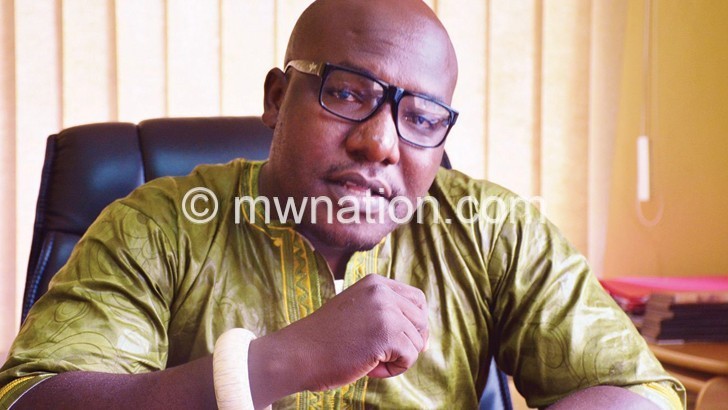No talks with DPP
Recently, President Peter Mutharika announced that he has established a task force to look into the petition submitted by protestors on April 27. Almost a month on, Our News Analyst ALBERT SHARRA caught up with Centre for Human Rights Rehabilitation (CHRR) executive director Timothy Mtambo, one of the organisers of the demonstrations, to track progress.

President Peter Mutharika refused to receive the petition from civil society organisations (CSOs)and this may promise slow reaction to the demands. What mechanisms have you put in place to ensure the issues are tackled?
The demonstrations were one of the greatest in our history. Everyone is aware that we have tried all the channels, including dialogue but failed. DPP has proven beyond measure that they are a party which does not believe in genuine dialogue but rather propaganda. Therefore, any efforts by anyone to demonise the constitutional right to hold duty-bearers to account is not only misleading citizens, but also fails to come to terms with the realities on the ground. It is no secret that the DPP government is allergic to accountability. This is the reason why Peter Mutharika from the onset was not willing to receive the petition, but heavily invested in cheap propaganda to discourage and instill fear in Malawians not to participate in the nationwide peaceful demonstrations.
Did government’s propaganda pay?
Thank heavens, they failed. On the eve of the April 27 demonstrations, DPP and its cadets paraded in the streets of Blantyre with violence-instigating messages. Any critical observer wouldn’t be alarmed with the approach of Mutharika and DPP to our demonstrations and our petition. They were bent on frustrating anything to do with objectives of the demonstrations. In fact, intolerance is what they have come to master.
How do you monitor the implementation of the demands contained in your petition?
As organisers, we will closely monitor government’s implementation of those democratically genuine demands and concerns raised in the petition. It won’t just be us organisers doing the monitoring. Thousands of Malawians whose constitutional right it is to hold their duty-bearers accountable on issues that affect their daily living are also monitoring. Government’s failure to address those concerns will see Malawians taking the DPP administration to task in a very uncommon way.
The President said he does not take ultimatums. How relevant are the ultimatums for social change?
There is nothing wrong with attaching deadlines to actionable issues. The concerns raised in the petition have been outstanding for quite some time. The issues are straightforward. If you are a true leader, you don’t need time to implement. For example, the demands to end electricity blackouts; investigate the murders of Robert Chasowa and Isaa Njauju; and to eliminate corruption have been outstanding for quite long. There has not been political will to resolve these issues. To effect such decisions, you don’t need ultimatums. Ultimatums are arrived at after a serious analysis of the kind of leadership you are dealing with. Any progressive thinker, employee or employer gets deadlines to complete certain tasks, this is why we, as the President’s employers, are giving him specific timeframes.
Don’t you think ultimatums only frustrate government from acting?
That’s not true. All concerns raised in the petition are not only for the organisers or civil society organisations. They are concerns that literary impact on the welfare of every citizen. A government that is responsive considers the welfare of its citizens. Therefore, a government that fails to address pressing concerns of its citizens, like the ones in the petition, cannot justifiably shoulder the blame on ultimatums. Let them fail to address the concerns and finally Malawians will know the kind of people whom they entrusted with power to govern. Interestingly, 2019 gives Malawians another opportunity to employ duty- bearers.
Other commentators believe follow-ups and dialogue can influence government better to act on petitions than ultimatums. What do you say?
Dialogue works where it is due. The problem is that you can hardly dialogue with DPP. We have tried many times but failed. How do you dialogue with a party which majors in propaganda? All they do is nothing, but propaganda. They have no principles to guide them, including their top leadership. Imagine, instead of acknowledging and appreciating successful and peaceful demonstrations citizens had, they watered it down and started lies that organisers and Malawians wanted to make the country ungovernable. What kind of leadership is that? Our 10-point demands are straightforward and can never be resolved through a dialogue.
To ensure dialogue in resolving the issues raised in petitions, what should government and CSOs do?
Dialogue has never worked with DPP. It is a party that is unapologetic and does not care about Malawians. CSOs have had dialogue in the past that has yielded no results. For example, after [July 20] 2011 demos, there was a dialogue that was constituted to engage the government, but nothing yield results.
Dialogue has to be in keeping with the nature of issues and concerns at hand. For instance how can you dialogue on the issue of bringing to book the murderers of Issa Njaunju, Robert Chasowa and people with albinism? How can you dialogue on ending blackouts? How can you dialogue on issues that are straight forward? The best this government can do is simply to start addressing the concerns and demands raised in the petition. Generally, the 10-Point Demand can never be resolved through dialogue. Otherwise, we are counting down. Come the expiry of 90 days, Malawians will speak. We are starting mobilisation now.
(Mtambo replied to our questions together with Centre for the Development of People (Cedep) executive director Gift Trapence.)





